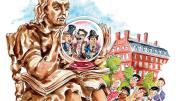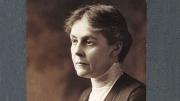1919
The Endowment Fund Committee notes that faculty members have “been struggling along with truly admirable self-denial” on a pay scale set in 1905 [instructors earn $1,200-$1,500, assistant professors $2,500-$3,000, full professors $4,000-$5,500]. The committee urges a 50 percent increase, one of several urgent outlays that require raising the campaign’s goal from $10 million to $15.25 million.
1934
The Harvard Corporation declines a gift for a traveling scholarship (for use in Germany) from twenty-fifth reunioner E.F.S. Hanfstaengl ’09 because of his close association with “a political party which has [damaged German universities] through measures which have struck at principles…fundamental to universities throughout the world.”
1959
The College’s eighth House, Quincy, opens for business, complete with snack bar, washing machines, and one refrigerator and storage room per suite.
1969
Of 140 students in the Medical School’s first-year class, 17 are black. During orientation, associate professor of surgery John C. Norman ’50, M.D. ’54, who had been asked to discuss “Possible Problems of the Black Student-Physician in the Harvard Community,” noted instead that “on infrequent occasions one or two, but in no case more than three, American Negroes entered [the school] in any particular year” until that week. To his knowledge, said Norman, “it has not been demonstrated what these problems have been, because minority-group health sciences personnel, in any meaningful numbers, have not yet been included in the Harvard ‘community.’”
1989
Harvard Divinity School opens a doctoral program in religion, gender, and culture—the first of its kind in the country and an outgrowth of the school’s successful women’s studies in religion program.
2004
For the first time, slightly more women (828) than men (818) enroll in the cohort of students entering the College, making the class of 2008 historic even before they begin their studies.








